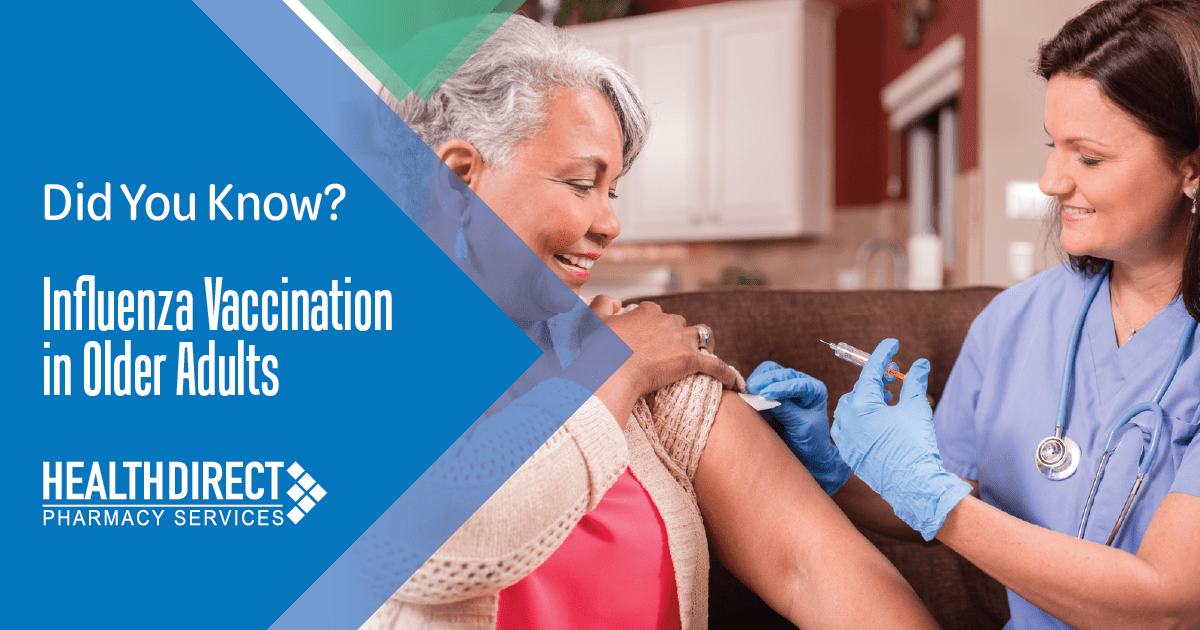Updated Recommendations
On June 30, 2022, the CDC made some important changes in regards to the influenza vaccine recommendations for adults 65 years and older. Previously, they did not recommend one vaccine over another. Currently, they give preference to 3 vaccines in this patient population:
Quadrivalent high-dose inactivated influenza vaccine (HD-IIV)-Fluzone HD Quadrivalent®:
- This vaccine contains 4 times the antigen compared to standard-dose inactivated flu vaccines. The antigen is the part of the vaccine that helps the body build up protection (antibodies) against flu viruses. As we age, the immune system becomes weaker and the body’s ability to have a good immune response after vaccination is weakened. A higher dose of antigen is supposed to give the older person a better immune response, and therefore, better protection against the flu.
Quadrivalent recombinant influenza vaccine (RIV4)- Flublok Quadrivalent®:
- This vaccine contains 3 times the antigen dose compared with standard-dose inactivated flu vaccines. With a higher dose of antigen, it is intended to give this patient population a better immune response as with the high-dose influenza vaccine. Recombinant flu vaccines are produced using recombinant technology, a method that does not require an egg-grown vaccine virus and does not use chicken eggs in the production process.
Quadrivalent adjuvanted inactivated influenza vaccine (aIIV4)- Fluad Quadrivalent®:
- This vaccine contains the same amount of antigen as other standard dose inactivated flu vaccines, but includes the adjuvant MF59. An adjuvant is an ingredient that is added to the vaccine that helps create a stronger immune response to vaccination, and therefore, better protection against the flu. MF59 is an oil-in-water emulsion of squalene oil, a naturally occurring substance found in humans, animals, and plants.
*** No preference is expressed for any one of these 3 vaccines over the other two ***
What Do the Studies Say?
- No direct, head-to-head studies have compared the 3 vaccines with each other.
- Observational studies, or real-world studies, have compared higher-dose and adjuvanted vaccines to standard dose vaccines in seniors. In this population, the studies suggested that the adjuvanted and higher-dose vaccines are potentially more effective than standard dose unadjuvanted flu vaccines.
How Safe are the Preferred Vaccines?
- Some side effects were reported more frequently with the high-dose and adjuvanted vaccines than the standard dose vaccines. Most were mild, resolved within a few days, and included pain, redness at injection site, headache, muscle aches, and malaise.
- The side effects of the recombinant flu vaccine were comparable to that of other standard flu vaccines.
Availability at Administration:
If none of the preferred vaccines listed above is available at an opportunity for vaccine administration, then any other age-appropriate influenza vaccine should be used as persons aged ≥65 years are at an increased risk of severe illness, hospitalization, and death and should be vaccinated against influenza.
References:
- Flu & People 65 Years and Older | CDC
- Grohskopf LA, Blanton LH, Ferdinands JM, et al. Prevention and Control of Seasonal Influenza with Vaccines: Recommendations of the Advisory Committee on Immunization Practices — United States, 2022–23 Influenza Season. MMWR Recomm Rep 2022;71(No. RR-1):1–28. DOI: http://dx.doi.org/10.15585/mmwr.rr7101a1




